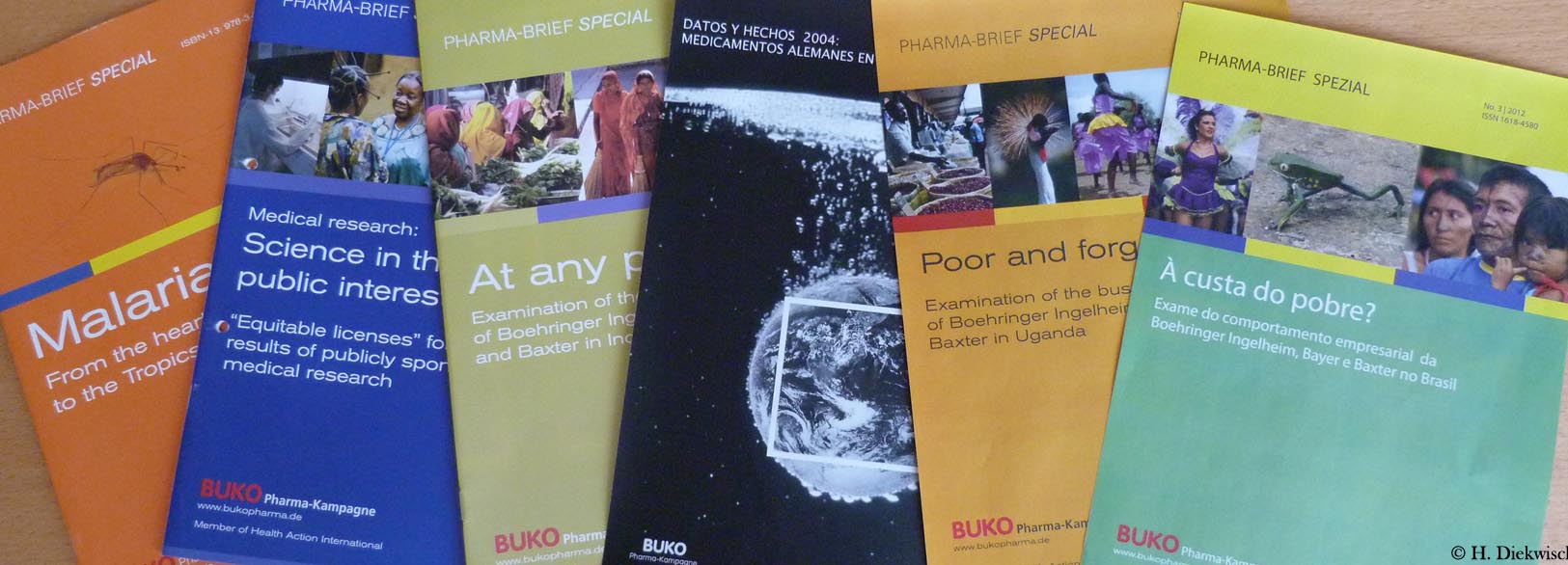English / Español / Português
GLOBAL HEALTH UNDER CRISIS
The impact of Covid-19 on health care in Peru, Ghana, South Africa and North Rhine-Westphalia, Germany
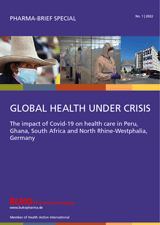 The Corona pandemic ignited a global health crisis. It caused care systems to collapse or brought them to the brink of their breaking point. Worldwide, this had a massive negative impact on patient care and also on the goal of universal access to good health care. Even in affl uent countries, surgeries were postponed, consultations cancelled and counselling services reduced in order to avoid infection and treat the many Covid-19 patients. The situation was far more serious in many poor countries: According to the World Health Organisation, the majority of basic health care services were at least partially impaired. Routine vaccinations, diagnosis and treatment of non-communicable diseases or family planning and contraception were particularly badly affected. Also severely affected was the control of tuberculosis, HIV and malaria. Together with partner organisations in Peru, South Africa and Ghana, we investigated the situation in various countries, analysed existing data material and conducted more than 30 interviews as well as a survey in NRW. This Pharma-Brief Special presents the results. And it is also a plea to learn from this crisis, to strengthen public health systems in the South and North and to better equip them against future crises.
The Corona pandemic ignited a global health crisis. It caused care systems to collapse or brought them to the brink of their breaking point. Worldwide, this had a massive negative impact on patient care and also on the goal of universal access to good health care. Even in affl uent countries, surgeries were postponed, consultations cancelled and counselling services reduced in order to avoid infection and treat the many Covid-19 patients. The situation was far more serious in many poor countries: According to the World Health Organisation, the majority of basic health care services were at least partially impaired. Routine vaccinations, diagnosis and treatment of non-communicable diseases or family planning and contraception were particularly badly affected. Also severely affected was the control of tuberculosis, HIV and malaria. Together with partner organisations in Peru, South Africa and Ghana, we investigated the situation in various countries, analysed existing data material and conducted more than 30 interviews as well as a survey in NRW. This Pharma-Brief Special presents the results. And it is also a plea to learn from this crisis, to strengthen public health systems in the South and North and to better equip them against future crises.
Resistant pathogens - A threat for humans, animals and the environment
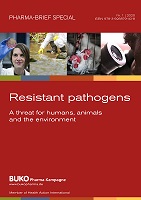 Resistant bacteria are spreading worldwide. In collaboration with partners in India, Tanzania, South Africa and Germany, we have investigated the causes and consequences of this spread.2 This Pharma-Brief Special presents the results. It examines the risks for humans, animals and the environment. It focuses on local problems and approaches, international interactions and the responsibility of doctors, farmers and consumers.
Resistant bacteria are spreading worldwide. In collaboration with partners in India, Tanzania, South Africa and Germany, we have investigated the causes and consequences of this spread.2 This Pharma-Brief Special presents the results. It examines the risks for humans, animals and the environment. It focuses on local problems and approaches, international interactions and the responsibility of doctors, farmers and consumers.
Download Brochure [PDF/4,8MB]
Tuberculosis - A global threat (2008)
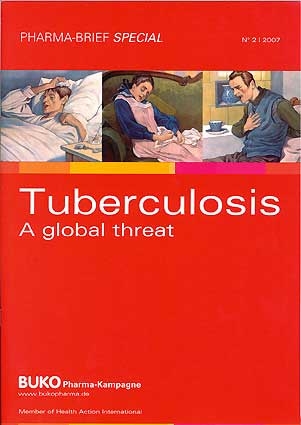
Download Brochure [PDF/ 1,3MB]
Tuberculosis - A social disease (2008)
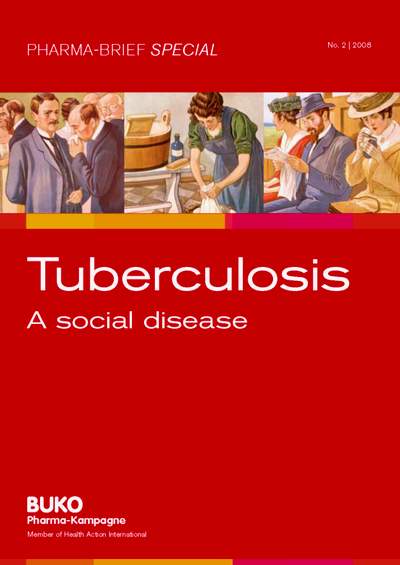
The fight against poverty, political strategies, better chances for education and equal rights for men and women are as urgent in the fight against TB as appropriate and affordable therapies.
Download Brochure [PDF/ 1,1MB]
Medical research: Science in the public interest - "Equitable licenses" for the results of publicly sponsored medical research (2009)
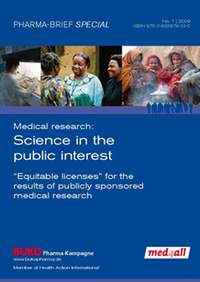
This brochure presents background information about challenges in the drug supply in poor countries. Numerous case studies show the US experience with new licensing models and highlight possible approaches for the specific German setting.
Download Brochure [PDF/ 1,3MB]
Malaria - From the heart of Europe to the Tropics (2010)
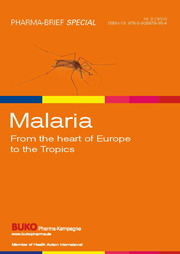 Malaria is considered to be a tropical disease today. In earlier days, however, it also caused much suffering in Europe. The marshes and moors of Northern Germany were dreaded malaria-infested regions up to the 19th century. Every second child in East Frisia is suspected to have been infected with the marsh fever during the epidemic in 1826. Similarly, outbreaks of malaria were quite frequent at the Upper Rhine. Fortunately, this is a thing of the past. On the southern hemisphere though, malaria is still harsh reality even today. Almost one million people die of a fatal mosquito bite each year, every 30 seconds a child dies. That is reason enough to take a look at the disease.
Malaria is considered to be a tropical disease today. In earlier days, however, it also caused much suffering in Europe. The marshes and moors of Northern Germany were dreaded malaria-infested regions up to the 19th century. Every second child in East Frisia is suspected to have been infected with the marsh fever during the epidemic in 1826. Similarly, outbreaks of malaria were quite frequent at the Upper Rhine. Fortunately, this is a thing of the past. On the southern hemisphere though, malaria is still harsh reality even today. Almost one million people die of a fatal mosquito bite each year, every 30 seconds a child dies. That is reason enough to take a look at the disease.
This Pharma-Brief Special gives information on prevention, therapy and supply problems, provides the background on current research projects and describes the history of malaria between colonial politics and military interests.
Download Brochure [PDF/ 1,1MB]
At any price? - Examination of the business behaviour of Boehringer Ingelheim, Bayer and Baxter in India (2011)
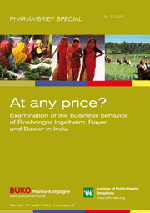 BUKO Pharma-Kampagne and the Institute of Public Health Bangalore/ India have made a survey of the business behavior of Bayer Health Care, Boehringer Ingelheim and Baxter in India. The results: these companies sell many irrational preparations and offer only few essential innovations. Bayer and Boehringer Ingelheim conduct numerous clinical trials in India, but they prefer to search for new applications of their blockbusters instead of doing research in the field of neglected diseases. Boehringer Ingelheim has a particularly poor pharmaceutical portfolio with 70% of irrational drugs and no essential preparation. Other topics of the survey focus on patent policies and marketing practices.
BUKO Pharma-Kampagne and the Institute of Public Health Bangalore/ India have made a survey of the business behavior of Bayer Health Care, Boehringer Ingelheim and Baxter in India. The results: these companies sell many irrational preparations and offer only few essential innovations. Bayer and Boehringer Ingelheim conduct numerous clinical trials in India, but they prefer to search for new applications of their blockbusters instead of doing research in the field of neglected diseases. Boehringer Ingelheim has a particularly poor pharmaceutical portfolio with 70% of irrational drugs and no essential preparation. Other topics of the survey focus on patent policies and marketing practices.
Download Brochure [PDF/ 1,5MB]
Update 26.9.2012: Boehringer reacts
Poor and forgotten - Examination of the business behaviour of Boehringer Ingelheim, Bayer and Baxter in Uganda (2014)
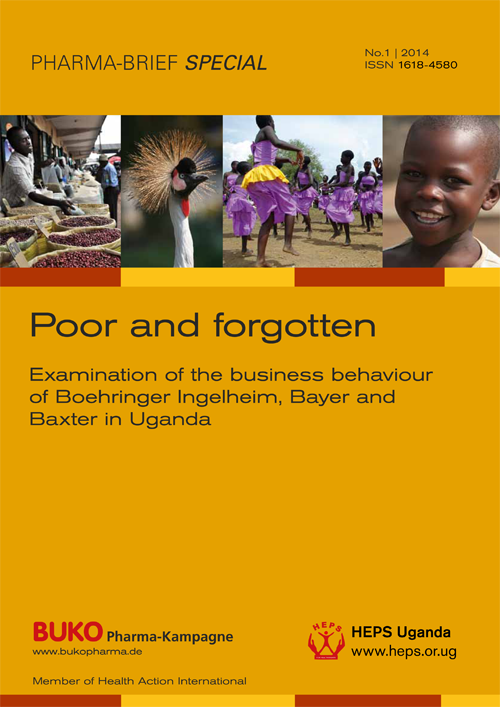 BUKO Pharma-Kampagne and HEPS Uganda have scrutinised the business behaviour of the pharma companies Bayer, Boehringer Ingelheim and Baxter in Uganda. The conclusion: The brand manufacturers have no or only little interest in supplying a country without solvent patients with drugs or in getting involved in research there. While Baxter has already given up on the Ugandan market, Boehringer Ingelheim is planning to retreat. Only Bayer carries on selling drugs in Uganda – among them several hormone preparations and contraceptives, some of them of rather dubious benefit. This study presents valid facts and analyses concerning Uganda and raises important questions actors and deciders in development and health policy have to face: For instance, how can you fill gaps in supply while the free market fails? How can you consolidate local production?
BUKO Pharma-Kampagne and HEPS Uganda have scrutinised the business behaviour of the pharma companies Bayer, Boehringer Ingelheim and Baxter in Uganda. The conclusion: The brand manufacturers have no or only little interest in supplying a country without solvent patients with drugs or in getting involved in research there. While Baxter has already given up on the Ugandan market, Boehringer Ingelheim is planning to retreat. Only Bayer carries on selling drugs in Uganda – among them several hormone preparations and contraceptives, some of them of rather dubious benefit. This study presents valid facts and analyses concerning Uganda and raises important questions actors and deciders in development and health policy have to face: For instance, how can you fill gaps in supply while the free market fails? How can you consolidate local production?
Download: Brochure [PDF/2,1 mB]
Antibiotic resistance: a global challenge (2015)
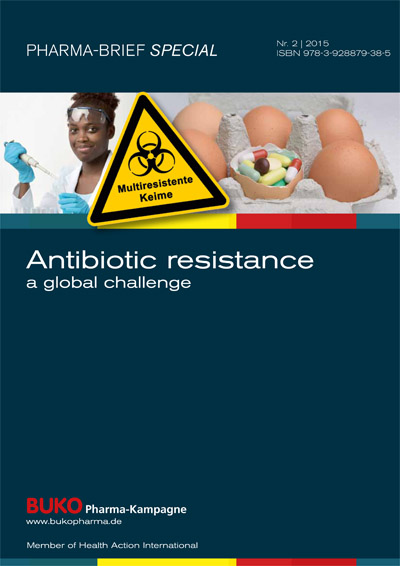 Antibiotics have been a blessing for medicine. Their discovery meant that infections which had previously caused great suffering and many deaths could now be treated. But the situation is changing dramatically, with more and more bacteria becoming resistant to an increasing number of active agents used in antibiotics. Every year tens of thousands of people die worldwide as a result of multiresistant microbes. And resistance does not stop at national borders: it develops anywhere and can spread anywhere.
Antibiotics have been a blessing for medicine. Their discovery meant that infections which had previously caused great suffering and many deaths could now be treated. But the situation is changing dramatically, with more and more bacteria becoming resistant to an increasing number of active agents used in antibiotics. Every year tens of thousands of people die worldwide as a result of multiresistant microbes. And resistance does not stop at national borders: it develops anywhere and can spread anywhere.
This is why any attempts to resolve the problem of resistance must be as global as its causes. The slogan 'One Health' must be understood in the broadest terms: the Global North and Global South, human and veterinary medicine, social components and technical solutions must be considered.
Download Brochure [PDF/2,8mB]
Portugues
À custa do pobre? - Exame do comportamento empresarial da Boehringer Ingelheim, Bayer e Baxter no Brasil (2012)
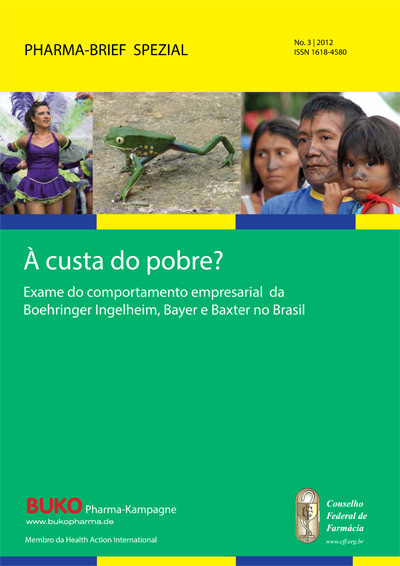 A BUKO Pharma-Kampagne examinou de forma criteriosa o comportamento empresarial da Bayer HealtCare, Boehringer Ingelheim e Baxter no Brasil. Nossas conclusões: enquanto o portfólio da Baxter compreende exclusivamente medicamentos racionais, a Bayer e a Boehringer Ingelheim oferecem um tanto de preparações sem sentido. Mesmo a maioria dos campeões de venda, declarados inovadores, não apresentam vantagem aos pacientes. Eles são inacessivelmente caros e levam ao desperdício de escassos recursos. As companhias examinadas realizam muitos projetos de pesquisa no Brasil. Estes são concentrados em áreas lucrativas tais como doenças cardiovasculares, câncer e diabetes - que são cada vez mais comuns no Brasil. Para doenças negligenciadas, ainda também comuns no Brasil, as companhias não mostram muito compromisso. Com quase 53% de medicamentos irracionais e grosseiros 10% de produtos essenciais, o negócio familiar Boehringer Ingelheim tem um portfólio farmacêutico chocante e ruim. Todavia, a companhia renuncia à aplicação estrita do direito de patente sobre seus medicamentos antirretrovirais. A importante nevirapina é portanto disponível como genérico de baixo preço no Brasil. A Bayer tem 63% de medicamentos racionais em seu portfólio e 20% de medicamentos essenciais. A agressiva política de patentes da companhia, entretanto, bloqueia o acesso ao antineoplásico inovador Nexavar®. Com produtos exclusivamente racionais, 74% deles essenciais, a Baxter tem o melhor portfólio farmacêutico. Alguns dos medicamentos, contudo, não têm alternativa genérica. Seus preços são altos e não podem ser oferecidos no setor público - um pesado fardo para os pacientes.
A BUKO Pharma-Kampagne examinou de forma criteriosa o comportamento empresarial da Bayer HealtCare, Boehringer Ingelheim e Baxter no Brasil. Nossas conclusões: enquanto o portfólio da Baxter compreende exclusivamente medicamentos racionais, a Bayer e a Boehringer Ingelheim oferecem um tanto de preparações sem sentido. Mesmo a maioria dos campeões de venda, declarados inovadores, não apresentam vantagem aos pacientes. Eles são inacessivelmente caros e levam ao desperdício de escassos recursos. As companhias examinadas realizam muitos projetos de pesquisa no Brasil. Estes são concentrados em áreas lucrativas tais como doenças cardiovasculares, câncer e diabetes - que são cada vez mais comuns no Brasil. Para doenças negligenciadas, ainda também comuns no Brasil, as companhias não mostram muito compromisso. Com quase 53% de medicamentos irracionais e grosseiros 10% de produtos essenciais, o negócio familiar Boehringer Ingelheim tem um portfólio farmacêutico chocante e ruim. Todavia, a companhia renuncia à aplicação estrita do direito de patente sobre seus medicamentos antirretrovirais. A importante nevirapina é portanto disponível como genérico de baixo preço no Brasil. A Bayer tem 63% de medicamentos racionais em seu portfólio e 20% de medicamentos essenciais. A agressiva política de patentes da companhia, entretanto, bloqueia o acesso ao antineoplásico inovador Nexavar®. Com produtos exclusivamente racionais, 74% deles essenciais, a Baxter tem o melhor portfólio farmacêutico. Alguns dos medicamentos, contudo, não têm alternativa genérica. Seus preços são altos e não podem ser oferecidos no setor público - um pesado fardo para os pacientes.
Descarregar [PDF/1,8mB]

